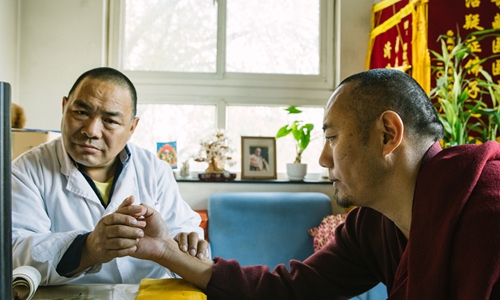Hyping Tibet medicine devt a futile attempt to stir China-India disputes: experts
By Shan Jie Source:Global Times Published: 2019/11/26 22:03:40

Lama'ala, an attending doctor at the Beijing Tibetan Medicine Hospital, feels the pulse of a visiting monk from Southwest China's Tibet Autonomous Region on Tuesday. Photo: Li Hao/GT
Tibetan medicine has prospered in China, and India's latest move to set up a Tibetan medicine institute in the disputed region Ladakh aims to hype its efforts in Tibet medicine development and is a futile attempt to stir disputes with China, Chinese experts noted, after Indian media reported that New Delhi was seeking to recognize the system as India's own intangible cultural heritage.
"The home of Tibetan medicine is in the Qinghai-Tibet Plateau of China and it has been developing here," Qin Yongzhang, an ethnologist at the Beijing-based Chinese Academy of Social Sciences, told the Global Times on Monday.
Luobu Zhaxi, vice director of the Tibetan Medical Center at the China Tibetology Research Center in Beijing, told the Global Times on Monday that the development of Tibetan medicine has seen great achievements in China with constitutional support. China now has 94 public hospitals of Tibetan medicine, five higher education institutes for maintaining talent and an annual output value of 6.5 billion yuan ($923 million) on producing Tibetan medicines, he said.
Luobu Zhaxi noted that China is working on safety evaluation and experimental data collection for Tibetan medicine.
In November 2018, UNESCO inscribed China's Lum medicinal bathing of Sowa Rigpa, which is a part of Tibetan medicine, on the representative list of intangible cultural heritage of humanity.
Tibetan medicine, or Sowa Rigpa in Tibetan, is over 2,000 years old. It has absorbed influences from traditional Chinese, Indian and Arabic medicine, according to the Xinhua News Agency.
According to a report by Press Trust of India (PTI) on Sunday, an anonymous Indian official said that "India has approached UNESCO, seeking enlisting of the Sowa Rigpa as its intangible cultural heritage."
The official noted that India was "strongly pushing" the UNESCO application.
Meanwhile, PTI reported that India's Union Cabinet on November 20 approved setting up a national institute for Sowa-Rigpa in Leh, Ladakh.
"India's plan to set up the Tibetan medicine institute in Ladakh is made on purpose, so that India could assimilate the region in order to merge Ladakh into India," Hu Zhiyong, a research fellow at the institute of international relations of the Shanghai Academy of Social Sciences, told the Global Times on Tuesday.
On October 31, the Indian government announced the establishment of the so-called "Union Territory of Ladakh," which involves China's territory.
"This is illegal, null and void," Chinese Foreign Ministry Spokesperson Geng Shuang said at that day's press conference. Chinese observers said India's move challenges China's sovereignty and warned that India's decision risked border frictions despite bilateral ties developing on a progressive track.
RELATED ARTICLES:
Posted in: DIPLOMACY,CHINA-INDIA